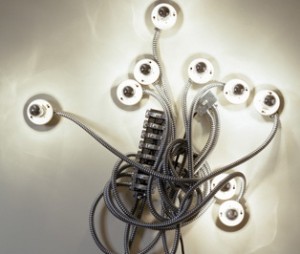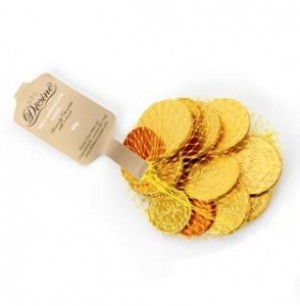Progress from Process

"Being the Light" (detail). Matthew McCaslin, mixed materials, detail. "Culture and Continuity: The Jewish Journey," Jewish Museum of New York.
The keyboard I am typing on is not of my own making. Processes beyond my sight (and ability) were involved in crafting this helpful thing. We all know, somewhere in the backs of our minds, that the food we eat, the clothing we wear, and the gadgets we use come from somewhere beyond our vision. It can be so easy to forget that they all, truly, come from one place: human labor. As a rabbi, I guide myself and others to offer gratitude to God and the Earth for every piece of abundance we are blessed to enjoy. But, regardless of one’s theology, it is clear that the hands that bring things from the earth, assemble bigger things from smaller things, and that bring things from one place to another are human.
The awful truth is that, all too often, the human owners of these artful hands are treated like things by a faceless global economy, of which I and you and everyone else are part. Rabbi Abraham Joshua Heschel once wrote, “A Process has no future. It becomes obsolete and is always replaced by its own effects. We do not ponder about last year’s snow.” Will we pause long enough to look at the objects we possess and see that what we think of as “process” is actually a chain of human beings? If not, then we participate in a criminal act of willful forgetting.
This is a lot to handle. Heavy stuff. And so I’ll offer that I believe the question is not: “How can I be free of all this?” but rather, “What actions can I take today to help one person become one step closer to freedom from slavery?” Unseen people around the world will remain invisible until those with the luxury to worry about others become aware of the forced labor that pervades society — and do something about it.
Thanks to organizations like Fair Trade Judaica and T’ruah: The Rabbinic Call for Human Rights, these steps are closer to home than you might think. FTJ is building a fair trade movement in the Jewish community, and is partnering with T’ruah’s 1,800 rabbis to promote Guilt-Free Chanukah Gelt, a (tasty, kosher) reminder of the freedom the Jewish people won many years ago.
Today, many young children are trafficked and forced into working on cocoa farms with no pay and in unsafe conditions in the Ivory Coast, where more than half of the world’s cocoa is grown. Fair Trade Judaica’s Guilt-free Gelt Campaign’s goal is to draw attention to this issue and let people know that fair-trade standards prohibit the use of child labor. Thanks to FTJ’s pioneering work in the Jewish community, and T’ruah’s amplification of this prophetic call, we stand a chance at change.
This year, when we hold pieces of Guilt-Free Gelt in our fingers by the glow of the chanukiah, I pray one more person somewhere in the world, far beyond our vision, might similarly savor the sweet taste of freedom.
Rabbi Menachem Creditor is spiritual leader of Congregation Netivot Shalom and author of “Peace in Our Cities: Rabbis Against Gun Violence”.
Learn more about bringing Fair Trade Judaica’s Guilt-Free Gelt to your community, family and friends.
![[the current issue of ZEEK]](../../image/2/100/0/5/uploads/leftistethicistgraphic-52842c6a.png)
- 5000 Pages of Zeek
- Founded in 2001, Zeek was the first Jewish online magazine, and we have over 5000 pages online to prove it, all available free of charge. Read more in the Archive.
More articles in
Faith and Practice
- To-Do List for the Social Justice Movement: Cultivate Compassion, Emphasize Connections & Mourn Losses (Don’t Just Celebrate Triumphs)
- Inside the Looking Glass: Writing My Way Through Two Very Different Jewish Journeys
- What Is Mine? Finding Humbleness, Not Entitlement, in Shmita
- Engaging With the Days of Awe: A Personal Writing Ritual in Five Questions
- The Internet Confessional Goes to the Goats


